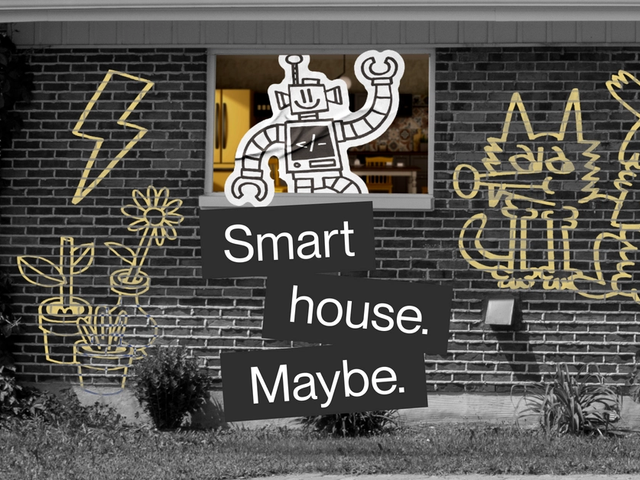
Francis, our Head of Telecom & Cofounder, is showing me the space under his dishwasher. Apart from a little dust, there's not much to see. Except for a little white puck that kind of looks like it ended up there by accident.
"And that's the sensor that shuts off the valves if there's ever a water leak in the kitchen."
I turn my head, forgetting our video call for a second to glance at the speaker on my kitchen counter: "Nest 8261." After six bugs where it just reset itself without asking me, I got tired of renaming it.
"And on top of that, the water inlet solenoid (otherwise known as a fancy wire) runs on a closed circuit managed by my AppleTV connected to a battery backup. That way, even if the power goes out, there's no risk of flooding!"
-
Not everyone is like Francis. He's been gradually adding new smart products to his home for years now. He started with just 6 in 2017 and today has over 130–yeah it was a long interview. And, he has some advice to anyone wanting to get into the home automation business:
"Once the infrastructure is in place, adding a light bulb here or a sensor there is pretty easy."
As for me, I have two Google Nest Mini speakers and their non-stop bugs bug me so much that I just haven’t been able to catch the smart home bug. (Hehehe.) It seems like an awful lot of trouble for a few small improvements to my daily life that I don't really need.
Would it be cool if my curtains opened gradually a few minutes before my alarm went off to make the act of waking up less painful? Yes, yes it would. Would it be convenient to have all the lights in my apartment dim at the same time whenever I start a movie? Obviously. And would I feel safer if I could check my phone at any time to make sure I've turned off the oven and locked the door? Probably–but only if I remembered to check my phone. And, for me, remembering to lock the door is pretty meh. I don't have all that much to steal other than my oven and the Nest Minis—and I really wouldn't miss them that much.
That’s where we get a glimpse into the reality of smart homes: they're modular and adaptable and ultimately not for everyone.
*I adapted this first section as Danilo—it was easier and I don’t have any Google Nests at home. But, from here on out, I’ve adapted the article from my, David’s, point of view.
The barrier to entry.
It was Francis who pointed out to me that most people start their smart home adventures with lights. An LED strip around the balcony, a colour-changing bulb for reading at night, a spotlight for ridiculously relaxing baths, etc. It's not all that expensive (although tens of dollars per bulb can be considered pretty pricey by some–myself included) and it's easily organized with an app on your phone and a few voice commands for your favourite assistant: Alexa, Siri, Google, Cortana (lol), etc.
By the time you get everything fine-tuned and functional, you’ll already have a basic understanding of how it all works. So, adding a camera that keeps an eye on your driveway becomes kind of easy. Install, plug it in, app it (new verb), and tada! After that, if you want to get into hubs, protocols, open-source compatibility and battery backup, you can! But you don’t have to.
But, but, but... why?
Oh, you didn't see that one coming, did you? Those pesky "why" questions can get out of control pretty quickly and lead to a series of whos, whats, hows and whys that ultimately end in a "because, ah… just because!" Well, that’s not going to stop us. So, why add a bunch of smart things to your home?
Well, that leads us to a completely different question...
What is a smart home?
The common thread (not Ariadne's thread—okay I, David, really need to stop for a second and let y’all know that I had to seriously google Ariadne’s thread because I did not know what the heck Danilo was talking about here. Turns out Ariadne's thread is solving a problem by multiple means—such as a physical maze, a logic puzzle, or an ethical dilemma—through an exhaustive application of logic to all available routes.1) Okay, let’s start this again: The common thread (not Ariadne’s thread) of most online sources define a smart home—which uses home automation—as devices, equipment, etc. that communicate with each other and with the user via the internet. I know this seems kinda vague, but it does manage to wrap everything up all neat and tidy-like.
Is a thermostat that can be programmed with weekend cycles or a washer that can start an hour before getting home a smart object? Well, the answer seems to be no. But, if the thermostat was connected to my Google Home ecosystem via wifi and my washer sent me an email when it was done, then the answer would be yes.
Now that we're all on the same page, let's get back to our humming and hawing:
Why make your home smart?
In my case, I loved my Nest thermostats that learned my temperature preferences. Heartbreakingly, I left them behind when I moved last year. Francis wanted to have a view of his street parking in case an accident happened out front. Danilo, the guy who originally wrote this article en français, just wanted all the speakers in all the rooms in his home to play at the same time—he apparently couldn’t make that happen. And, if you’re looking for a more concrete reason: the internet is full of people who rely on automating their lights, heating, ventilation, etc. to save money.
So, if we try to divide smart home users into a few categories that, you know, completely ignore the uniqueness of each of us in order to make a more compact article, it might look like this:
- Comfort.
- Security.
- Entertainment.
- Economy.
But heads up, just because security is important to you doesn't mean you're doing a bad job by not having cameras in every corner. That's not what we’re trying to get at here. But, on the other hand, if you're interested in taking one of these areas a little further, there are ways to do that via a smart(er) home.
Okay so...
Is a smart home for you?
Let's face it: smart homes are definitely still not perfect. Far from it.
Like Danilo’s speakers that reset without him having any say in the matter, the reliability of devices, hubs, protocols and manufacturers is still, let’s say, shaky2. For now, many companies use their own systems to make their devices work, which makes integration with other devices maddeningly difficult.
There are also cost issues. This mountain of gizmos and software is expensive in the long run (and even in the short run)! Not everyone is willing to siphon off their grocery money to have a relaxed atmosphere in their painting studio.
And if you're in an apartment, and inevitably want or need to move, you're probably gonna want to take your stuff with you. If you sell a house, will the next owners benefit from having a smart home? Does it become a selling point3 or is it a detriment because of its idiosyncrasy4?
There’s also the double-edged sword of security. If you buy a camera to monitor your driveway, you’ll need to accept that not all manufacturers focus on the security of the devices themselves. A connection can be hacked and suddenly we’re the ones under surveillance. Does installing a camera to keep an eye on your pet end up becoming a risk? Should we make sure we don't do anything sketchy in front of our own camera, just in case? (I definitely am not about to start wearing pants when it’s 32°C out. Or anytime really.) Studies already show how being watched can increase anxiety as your sense of privacy is broken5,6,7,8. So, are we shooting ourselves in the foot by wanting to be more secure?
And don’t get me started on planned (or even accidental) obsolescence. Many forum users repeat loud and clear that a smart device that requires a cloud server from any company is just a future paperweight. We can never predict which company will disappear and reduce our speaker to another trinket we’re not sure how to get rid of when their servers are shut down.
And if the Matrix shows up, every device will suddenly become a little soldier trying to capture us in our sleep! Okay, I'm kidding (kind of), but the amount of data we give away for free to GAFAMs or other companies that eventually get bought by one of the GAFAMs in exchange for a little comfort, security, entertainment or just to save some money is pretty shocking. With Facebook-like9 information leakage scandals multiplying all the time, should we think twice before inviting even more surveillance into our home?
Despite all that, there’s some good news.
The Matter protocol, which was agreed upon and created by a coalition of major tech companies, could be a legit step in the right direction10. It would allow ALL companies to build and code their devices using the same protocol—making everything interconnectable. That would solve a lot of problems, but we’ll believe it when we see it.
Secondly, some producers have latched onto the need to provide an intimate experience without jeopardizing privacy. Apple's HomeKit is encrypted and its data is accessible only to the user (but there's always risks11). Many speakers have physical switches to mute their microphones (including the entire Google Nest suite). So you can get equipped without giving your data away to anyone and everyone.
Also, the extra layer of security offered by sensors, cameras and recordings is undeniable. It's gotten to the point where insurance companies are offering better prices for homes secured by smart devices12. And insurance companies don’t just give money away for free, so the statistics must look good.
In the end, the comfort and enjoyment of a home that is tailored to you with its carefully chosen gadgets and connections can be worth it.
So, is it for you?
Francis wants to make one thing clear: "It's all very nice, but it was a mess to set up. When it works, it's magic. When it doesn't work, it's problematic."
So maybe you feel, like Danilo and me do, that the smart home is an interesting concept, but not mature enough and just too unstable and complicated. Or maybe you see what Francis has accomplished and you're tempted to add a little smart to your home.
Whatever you think, it's the right answer. Smart homes are unique to each individual and no one can tell you if it's for you. This article isn't about telling you what to think, it's about letting you discover what you think.
The crazy number of smart home examples we used came mostly from r/HomeAutomation and r/HomeAssistant. Oh and a big shout out to Francis Careau—oxios co-founder for his time and insights. Annnnnd to Danilo Tubic for writing an article that was legit fun to adapt.
- Ariadne's thread (logic) - Wikipedia
- The smart home is flailing as a concept—because it sucks
- How Smart Home Technology Can Be a Selling Point
- How the heck will anyone sell their “smart home” without confounding the next owners? r/smarthome
- Watch Out: The Psychological Effects of Mass Surveillance
- Negative effects of computerized surveillance at home: Cause of annoyance, concern, anxiety, and even anger -- ScienceDaily
- CCTV increases people's sense of anxiety | Society | The Guardian
- What Constant Surveillance Does to Your Brain
- Facebook–Cambridge Analytica data scandal - Wikipedia
- The Matter smart home protocol: What is it, and why is it a big deal?
- iPhone users urged to update devices after Apple security flaw | News | The Times
- 3 ways having a smart home makes you a smart homeowner | belairdirect blog







